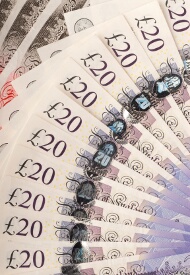The British pound erased earlier gains against the US dollar and other major peers on Wednesday, despite the best reading for manufacturing activity since September. A separate report on housing prices in the United Kingdom revealed a healthy increase, however, the British currency failed to maintain its gains.
A fresh report from IHS Markit, a research institute that releases monthly updates on manufacturing activity within major economies, showed that manufacturing activity climbed in the United Kingdom. The UK manufacturing purchasing managersâ index rose to 56.3 in October from 56.0 in September, which beat estimates of a drop to 55.8. Readings of the index above 50.0 indicate increases in manufacturing activity.
The IHS Markit report stated that the increase stemmed from higher production and new order volumes, which continued to increase at robust rates. However, pressures from a high inflation rate in the United Kingdom reduced the overall gain as input costs and output charges accelerated above historical averages.
The increase in new orders mainly came from higher demand in domestic markets, while an increasing inflow of new export businesses also contributed to the increase. The strong manufacturing activity last month reflected on the job market, which posted a gain that resulted from higher staffing demands to meet production requirements.
The British pound initially rose to the best level against the US dollar in more than two weeks. A separate reading for home prices, which showed a 2.5% climb that compared to expectations of a 2.2% gain, gave the British currency further support.
However, strong labor data in the United States forced the British pound to give up its gains. The ADP Research Institute said that nonfarm employment increased 235,000 in October, which was 35,000 more jobs than analysts had expected.
Concerns about the future of the Brexit negotiations continued to weigh down on the British currency. Investors awaited more clarity on the future of economic relations between the United Kingdom and the European Union, however, officials provided few details so far.
GBP/USD moved down to 1.3264 as of 14:25 GMT on Wednesday after rising to 1.3305 at 08:35 GMT, the pairâs highest level since October 13. GBP/USD began trading today at 1.3277.
EUR/GBP traded at 0.8762 after dropping to 0.8737 at 12:10 GMT, a level last seen on June 16. EUR/GBP was at 0.8763 when the day started.
If you have any questions, comments or opinions regarding the Great Britain Pound,
feel free to post them using the commentary form below.
